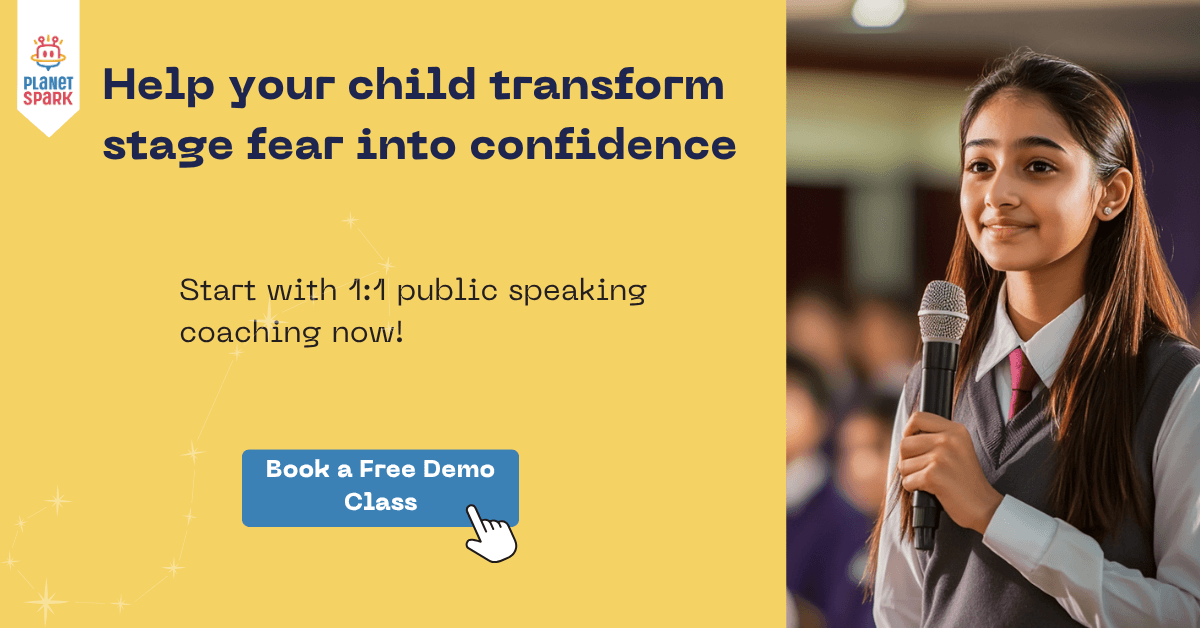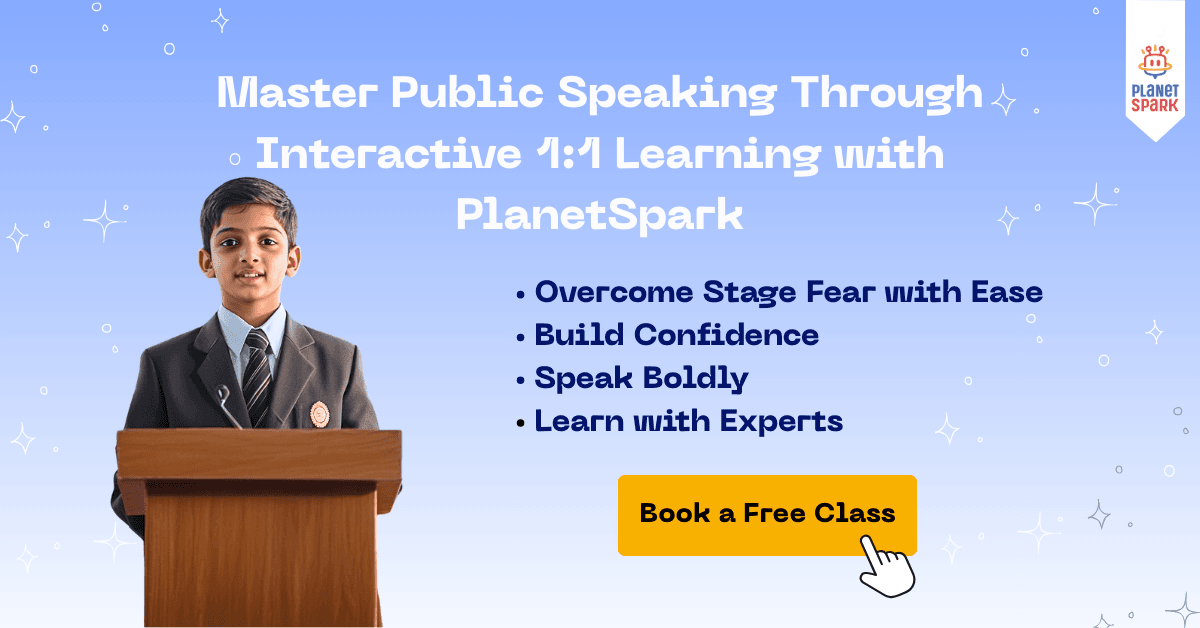50+ Unique Speech Topics for Students – Tips, Examples & Guidance
Last Updated At: 29 Sep 2025
10 min read

Table of Contents
- 50+ Unique Speech Topics for Students
- Why Choosing a Unique Speech Topic Matters
- Tips to Choose a Great Speech Topic
- How Unique Topics Help You Stand Out
- How to Write a Speech for Unique Topics
- Common Speech Format for Unique Speech Topics
- Tips for Writing and Delivering a Great Speech
- Common Mistakes Students Make in Speeches
- Practice and Improve Speech Skills with PlanetSpark
- Conclusion
- FAQs
Giving a speech in school can be exciting, but it can also feel a little scary. Choosing the right topic is the first step toward making a speech interesting and memorable. While common topics are easy to find, unique speech topics help students stand out, capture the audience’s attention, and express their ideas creatively.
In this blog, we will share a list of unique speech topics for students, along with tips on how to choose a topic, write an engaging speech, and practice effectively. Whether it’s for a classroom presentation, a school competition, or a fun activity, these ideas will inspire students to speak confidently and think creatively.
50+ Unique Speech Topics for Students
1. School & Education
Why Homework Can Be Fun
A Day in the Life of a Teacher
My Favorite Subject and Why
How to Make Learning Exciting
If I Were the Principal for a Day
The Importance of School Libraries
How to Stay Motivated in Studies
The Role of Technology in Education
My Dream Classroom
How to Balance Studies and Hobbies
Explore Fun and Unique Speech Topics
Schedule a Free Demo Now!
2. Science & Technology
How Robots Can Help Us
Life on Other Planets
The Magic of Space Exploration
My Dream Invention
How Computers Have Changed Our Lives
The Future of Artificial Intelligence
Amazing Discoveries in Science
How Science Helps Us in Daily Life
If I Could Travel Through Time
The Wonders of the Human Brain
3. Environment & Nature
If Trees Could Talk
The Secret Life of Rivers
How to Save Endangered Animals
The Importance of Clean Water
How I Can Help Save the Environment
Life Without Electricity
The Wonders of Oceans
Why Recycling Matters
The Beauty of Mountains
My Favorite Season and Why
4. Social Awareness & Values
Why Kindness Matters
The Importance of Friendship
How to Be a Good Citizen
Helping the Poor and Needy
The Power of Teamwork
Why Honesty Is the Best Policy
Learning From Mistakes
The Importance of Respect
How to Stop Bullying in School
The Value of Sharing
5. Fun & Creative Topics
If I Were Invisible for a Day
My Dream Vacation
If I Could Talk to Animals
The Day I Became a Superhero
My Favorite Hobby and How It Helps Me
A World Without Mobile Phones
If I Could Fly Like a Bird
My Life as a Cartoon Character
The Best Day of My Life
How I Would Spend One Million Dollars
My Favorite Childhood Memory
If I Could Be a Movie Character
How I Imagine Life 100 Years From Now
The Secret World of My Imagination
Why Choosing a Unique Speech Topic Matters
- Stand Out from the Crowd
Many students pick common topics like “My School” or “My Hobby.” A unique topic helps you capture your audience’s attention and makes your speech memorable. - Show Creativity and Originality
Unique topics allow students to express their ideas creatively, share personal experiences, and think outside the box. - Boost Confidence
Speaking about a topic that is different or special gives students a sense of pride and confidence. - Engage Your Audience
Interesting and unique topics keep classmates, teachers, and judges attentive and curious about what you will say next. - Encourage Research and Learning
Choosing a unique topic often requires learning new facts, exploring ideas, or sharing unusual experiences, which improves knowledge and thinking skills. - Better Performance in Competitions
In speech competitions, originality is noticed and rewarded. Unique topics can make a big difference in scoring and impact.
By selecting a unique topic, students can make their speeches more exciting, meaningful, and enjoyable for both themselves and their audience.
Tips to Choose a Great Speech Topic
1. Choose What You Love
Pick a topic you are excited about. It’s easier to speak confidently about something you enjoy.
2. Keep It Simple
Make sure the topic is easy to understand and explain. Avoid very complicated ideas.
3. Think Differently
Try a unique angle on common topics. Being creative will make your speech stand out.
4. Know Your Audience
Think about who will listen to your speech. Choose something interesting and relatable.
5. Do a Little Research
If your topic has facts, check them first. For fun topics, think of stories or examples to share.
6. Focus on One Idea
Don’t try to cover too much. Stick to one main idea so your speech is clear and organized.
7. Practice, Practice, Practice
Rehearse your speech several times. Practice helps you remember points and speak confidently.
How Unique Topics Help You Stand Out
Choosing a unique speech topic helps you stand out because it immediately grabs the audience’s attention. While many students may speak about common subjects, a fresh or unusual topic makes your speech memorable and shows creativity. It allows you to share original ideas, express your personality, and present your thoughts in a way that others may not have considered. Unique topics also make judges, teachers, and classmates more interested in listening, which can boost your confidence and leave a lasting impression. By speaking on something different, you not only capture attention but also demonstrate originality and critical thinking.
How to Write a Speech for Unique Topics
Writing a speech for a unique topic may seem tricky, but following a simple structure makes it easy and fun. Start with a strong introduction that grabs attention, use a question, a story, or an interesting fact. Next, organize the body of your speech into 2–3 main points. Each point should explain your idea clearly and include examples or personal experiences to make it engaging. Finally, end with a conclusion that summarizes your main points and leaves a lasting impression.
Keep your sentences simple, use your own words, and speak naturally. Remember to practice aloud, focus on clear pronunciation, and use gestures or expressions to make your speech lively. By following this structure, students can confidently deliver speeches on unique topics while keeping the audience interested and engaged.
Common Speech Format for Unique Speech Topics
Using a structured format helps students present their ideas clearly and confidently. Here’s a simple format to follow:
1. Introduction
Start with a hook: a question, quote, or interesting fact.
Introduce your topic clearly.
Give a brief idea of what your speech will cover.
2. Body
Divide your main ideas into 2–3 points.
Explain each point with examples, stories, or personal experiences.
Keep sentences simple and easy to understand.
3. Conclusion
Summarize your key points.
End with a strong statement, call to action, or thought-provoking idea.
Leave a lasting impression on the audience.
Tips:
Speak slowly and clearly.
Use gestures and facial expressions to make your speech engaging.
Practice multiple times to gain confidence.
Following this format ensures that students can deliver unique speech topics in a clear, organized, and engaging way.
Make Speech Practice Exciting and Easy
Book Your Free Demo Today!
Tips for Writing and Delivering a Great Speech
1. Understand Your Topic
Before writing, make sure you fully understand your topic. Research or think about examples, stories, or facts you can share.
2. Write in Simple Language
Use clear and simple words. Avoid complicated sentences so your audience can easily understand your ideas.
3. Organize Your Speech
Follow a structure: Introduction → Body → Conclusion. Highlight 2–3 main points and give examples for each.
4. Start Strong
Begin with an interesting fact, question, or story to grab attention from the very first sentence.
5. Practice Regularly
Rehearse your speech multiple times. Practicing helps you remember points, improve fluency, and speak confidently.
6. Use Voice and Gestures
Speak clearly, vary your tone, and use gestures or facial expressions to make your speech engaging.
7. Maintain Eye Contact
Look at your audience while speaking. It makes your speech more personal and keeps listeners attentive.
8. Keep it Short and Focused
Stick to the main points. Avoid adding unnecessary details that may confuse the audience.
9. Be Confident and Relaxed
Take deep breaths before speaking. Confidence shows in your voice and body language, making your speech more effective.
Following these tips will help students write compelling speeches and deliver them confidently, leaving a strong impression on their audience.
Common Mistakes Students Make in Speeches
1. Choosing a Topic That’s Too Difficult
Picking a topic that is too complicated can make it hard to explain and may confuse the audience.
2. Reading the Speech Word-for-Word
Simply reading from a paper makes the speech less engaging. Students should speak naturally and maintain eye contact.
3. Speaking Too Fast or Too Slowly
Rushing can make the speech hard to understand, while speaking too slowly may bore the audience. Practice a balanced pace.
4. Forgetting the Structure
Skipping the introduction, body, or conclusion can make the speech confusing. Always follow the standard speech format.
5. Ignoring Gestures and Expressions
Not using gestures, facial expressions, or voice modulation can make a speech monotonous. Engage your audience visually and vocally.
6. Adding Too Many Points
Trying to cover too much can overwhelm the audience. Focus on 2–3 main ideas and explain them clearly.
7. Lack of Practice
Not rehearsing enough can lead to forgetting points or losing confidence. Practice multiple times to gain fluency and comfort.
By avoiding these mistakes, students can deliver unique speeches confidently, keeping the audience interested and leaving a strong impression
Practice and Improve Speech Skills with PlanetSpark
At PlanetSpark, students can enhance their public speaking and communication skills in a fun and interactive way. Our programs are designed to help students choose unique speech topics, write engaging speeches, and deliver them confidently.
How PlanetSpark Helps:
Expert Guidance: Experienced teachers guide students step by step in speech writing and delivery.
Personalized Feedback: Every student receives tips to improve voice, gestures, and overall presentation.
Fun Practice Sessions: Interactive online classes make speech practice enjoyable and motivating.
Variety of Topics: Students get access to a wide range of speech topics suitable for their grade and interests.
Confidence Building: Regular practice in a supportive environment helps students speak confidently in front of classmates, teachers, or competition judges.
With PlanetSpark, learning to give speeches becomes an exciting journey. Students not only master unique speech topics but also develop lifelong communication and leadership skills.
Conclusion
Choosing and delivering a unique speech topic helps students stand out, think creatively, and communicate effectively. By picking topics that are interesting, practicing regularly, and following a clear structure, students can gain confidence and leave a lasting impression on their audience. Guidance from parents, teachers, and platforms like PlanetSpark makes the process even more enjoyable and effective. With consistent practice, students can not only excel in school presentations and competitions but also develop essential skills for future success.
FAQs
1. What are unique speech topics for students?
Unique speech topics are ideas that are creative, original, and different from common subjects. They help students stand out and engage their audience.
2. How can I choose a good speech topic?
Pick a topic you are passionate about, keep it age-appropriate, think creatively, and consider your audience.
3. How long should a student’s speech be?
For most classroom speeches, 2–5 minutes is ideal. Competitions may have specific time limits.
4. Can students use stories or humor in their speeches?
Yes! Using stories, examples, or gentle humor makes speeches more engaging and memorable.
5. How can PlanetSpark help with speech practice?
PlanetSpark provides expert guidance, interactive practice sessions, feedback, and a variety of speech topics to help students improve confidence, writing, and delivery skills.
Personalized Communication Report
Record a video to get a AI generated personalized communication report for your child
Select Learner's Class

Hi There, want to try these
tips for your child with
LIVE with our expert coach?
Let's check your child's
English fluency


